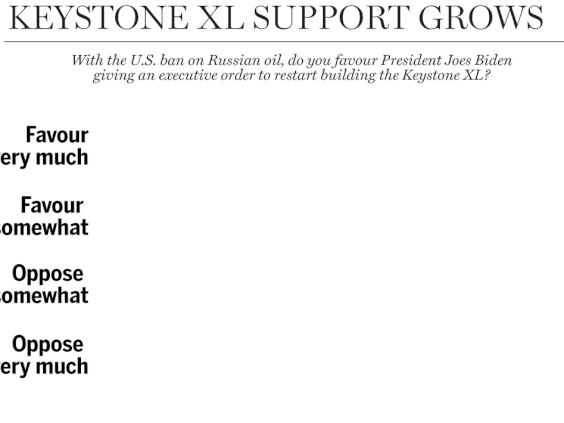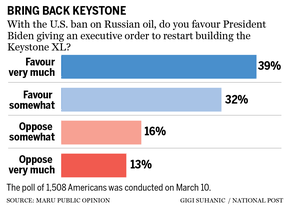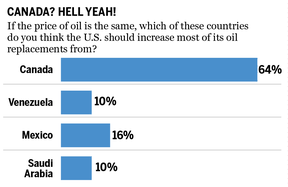March 15, 2022
-National Post
More than a year after President Joe Biden killed the Keystone XL project, support for the pipeline has surged in the U.S. in the wake of the country’s ban on the import of Russian oil, a new poll shows.

The exclusive poll of Americans conducted by Maru Public Opinion for Postmedia found that 71 per cent of Americans think Biden should give an executive order to “green light the restart of the building of the Keystone XL pipeline that would transport oil from Canada’s oil sands region through the Midwest to refineries in Texas.”
The idea that Canadian oil and gas could help fill shortfalls in Europe and the United States has received considerable traction in the weeks since Russia invaded Ukraine, with some re-evaluating energy projects such as Keystone XL and Energy East.
While 64 per cent of American believe Canada should fill the void left following the ban on Russian oil, the challenge for Canada would be in increasing production — it could take years, not weeks or months — and figuring out how to ship it across the border.
Between 2014 and 2017, according to polling from the Pew Research Center, support for the Keystone XL pipeline dropped 17 percentage points, from 59 per cent to 42 per cent. It also had a major partisan divide in 2017, with 76 per cent of Republicans or Republican-leaning independents supporting it, and 74 per cent of Democrats opposing it. That year, then-president Donald Trump reversed former president Barack Obama’s decision to halt the pipeline. In January 2021, Biden revoked the cross-border permits the pipeline needed, and the project was officially dead by June 2021.

John Wright, Maru Public Opinion’s executive vice-president, said the polling suggests that despite the Democrats’ ardent environmental wing, Biden could have the political capital to reverse course on Keystone XL.
“It would appear that the public, given the current circumstance, has decided that this is a bipartisan solution to what is now an unprecedented circumstance,” Wright said.
Last week, Mark Little, the CEO of Suncor Energy Inc., said Canada could increase production in the short term by roughly 200,000 barrels per day. Kevin Birn, an energy analyst with IHS Markit, said Canadian companies could work more efficiently and squeeze some more oil out of the ground.
“Yeah, Canada could increase output. But it’s not something it’s going to do overnight,” said Birn.
“We are largely approaching full capacity on our pipe system … and we have substantial room to grow rail,” McMillan said.

For the Americans, there are other options for oil, including Mexico, which 16 per cent of Americans believe should fill the supply, followed by Venezuela at 10 per cent and Saudi Arabia at 10 per cent.
“Canadian oil is a better choice in their minds over other foreign opportunities, and that bodes well for Canada,” Wright said.
The United States gets about 51 per cent of its petroleum imports from Canada, at around four million barrels per day, followed by eight per cent from Mexico and Russia, at 710,000 and 670,000 barrels per day, respectively. (Much of Canada’s exports to the U.S. are heavy crude oil; many Russian exports to the U.S. are partially finished or partially refined, Birn said.)
“It isn’t a perfect match. That’s absolutely true. But the refineries are good at adapting,” Birn said.
Whatever problems might arise from the U.S. response to the war, such as high gasoline prices, 82 per cent of Americans support Biden’s ban on Russian oil, the poll shows.
If the Keystone project hadn’t been scrapped in January 2021, it would have come online in the first quarter of 2023; now with more than a year’s delay, it’s not clear when that could even happen.
“So, even starting today it is probably the fastest piece of infrastructure that could be built in North America,” said McMillan.
Regardless, TC Energy has said it has no plan to restart the project, though Alberta Premier Jason Kenney said last week the provincial government would, in theory, back such a project, if there were assurances from the White House it would proceed.
The polling was done on March 10, via a panel of 1,508 randomly selected American adults who are Maru Springboard America online panelists. A probability sample of this size would have an estimated margin of error of plus or minus 3.1 per cent, 19 times out of 20.




